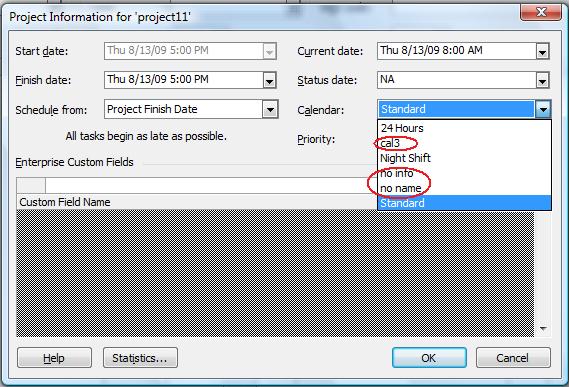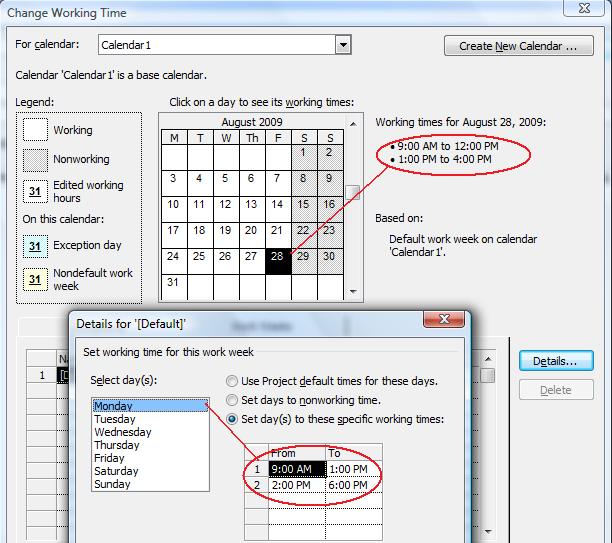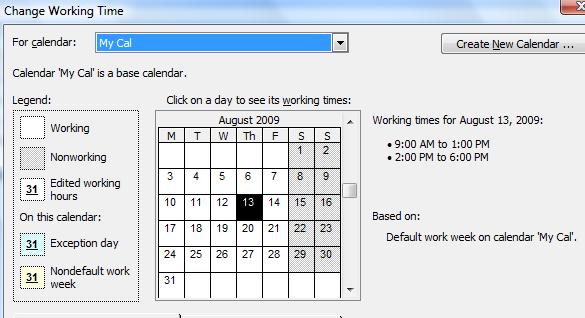Kalender erstellen
Erstellen eines Kalenders
Kalender und andere Informationen werden von Microsoft Project verwendet, um Projektpläne zu erstellen. Bei Aspose.Tasks für C ++ ist das Hinzufügen eines Kalenders zu einem Projekt einfach. Mit den Konstruktoren der Kalenderklasse können Sie dem Kalender eine ID oder einen Kalendernamen zuweisen oder den Standardkonstruktor verwenden. Die Optionen werden nachstehend beschrieben.
Es gibt drei Möglichkeiten, um einen Kalender in Asposes.Tasks zu erstellen. Die Kalender Klasse enthält die folgenden drei Konstruktoren:
- Calendar () - Standardkonstruktor.
- Kalender (int ID) - Erstellt einen Kalender mit einer ID.
- Kalender (Zeichenfolge Name) - Erstellt einen Kalender mit einem Namen.
Der folgende Code erstellt drei verschiedene Kalender, eine mit jedem Konstruktor. Öffnen Sie die Ausgabedatei in Microsoft Project und wählen Sie im Menü project Projektinformationen, um auf die Kalender zuzugreifen.
Projektinformationen zeigen die Kalenderinfo

1// Create a project instance
2System::SharedPtr<Project> project = System::MakeObject<Project>();
3
4// New calendar can be added to a project's calendar collection using the collection's Add method.
5System::SharedPtr<Aspose::Tasks::Calendar> cal1 = project->get_Calendars()->Add(u"New Info");
6System::SharedPtr<Aspose::Tasks::Calendar> cal2 = project->get_Calendars()->Add(u"no name");
7System::SharedPtr<Aspose::Tasks::Calendar> cal3 = project->get_Calendars()->Add(u"cal3");
8
9// Save the Project
10System::String dataDir = Examples::CPP::RunExamples::GetDataDir(System::Reflection::MethodBase::GetCurrentMethod(ASPOSE_CURRENT_FUNCTION)->get_DeclaringType().get_FullName());
11project->Save(dataDir + u"CreatingCalendar_out.Xml", Aspose::Tasks::Saving::SaveFileFormat::XML);Defining Weekdays for Calendar
Microsoft Project keeps track of which days are considered weekdays in a calendar so that it can calculate project end dates and so on. Aspose.Tasks for C++ API allows developers to define weekdays for a calendar associated with a project.
The Days collection exposed by the Calendar class is used to define the weekdays for a calendar. The Days collection represents an array list of WeekDay objects.
The CreateDefaultWorkingDay method exposed by the WeekDay class can further be implemented to define the default day timings, while the FromTime and ToTime properties exposed by the WorkingTime class is used to define the specific timing for a day. FromTime and ToTime support the DateTime datatype.
The code samples below set weekdays for a project. After running the code, open the output file in Microsoft Project and, on the Tools menu, select Change Work Timing to establish that the changes have been applied.
Defining weekdays in Microsoft Project

The code sample given below defines Monday through Thursday as weekdays with default timings, whereas Friday as a weekday with special timings.
1// This example shows how Aspose.Tasks API can be used to define a new Calendar, add week days to it and define working times for days
2// Create a project instance
3System::SharedPtr<Project> project = System::MakeObject<Project>();
4
5// Define Calendar
6System::SharedPtr<Aspose::Tasks::Calendar> cal = project->get_Calendars()->Add(u"Calendar1");
7
8// Add working days monday through thursday with default timings
9cal->get_WeekDays()->Add(WeekDay::CreateDefaultWorkingDay(Aspose::Tasks::DayType::Monday));
10cal->get_WeekDays()->Add(WeekDay::CreateDefaultWorkingDay(Aspose::Tasks::DayType::Tuesday));
11cal->get_WeekDays()->Add(WeekDay::CreateDefaultWorkingDay(Aspose::Tasks::DayType::Wednesday));
12cal->get_WeekDays()->Add(WeekDay::CreateDefaultWorkingDay(Aspose::Tasks::DayType::Thursday));
13cal->get_WeekDays()->Add(System::MakeObject<WeekDay>(Aspose::Tasks::DayType::Saturday));
14cal->get_WeekDays()->Add(System::MakeObject<WeekDay>(Aspose::Tasks::DayType::Sunday));
15
16// Set friday as short working day
17System::SharedPtr<WeekDay> myWeekDay = System::MakeObject<WeekDay>(Aspose::Tasks::DayType::Friday);
18
19// Sets working time. Only time part of DateTime is important
20System::SharedPtr<WorkingTime> wt1 = System::MakeObject<WorkingTime>();
21wt1->set_FromTime(System::DateTime(1, 1, 1, 9, 0, 0, 0));
22wt1->set_ToTime(System::DateTime(1, 1, 1, 12, 0, 0, 0));
23System::SharedPtr<WorkingTime> wt2 = System::MakeObject<WorkingTime>();
24wt2->set_FromTime(System::DateTime(1, 1, 1, 13, 0, 0, 0));
25wt2->set_ToTime(System::DateTime(1, 1, 1, 16, 0, 0, 0));
26myWeekDay->get_WorkingTimes()->Add(wt1);
27myWeekDay->get_WorkingTimes()->Add(wt2);
28myWeekDay->set_DayWorking(true);
29cal->get_WeekDays()->Add(myWeekDay);
30
31// Save the Project
32System::String dataDir = Examples::CPP::RunExamples::GetDataDir(System::Reflection::MethodBase::GetCurrentMethod(ASPOSE_CURRENT_FUNCTION)->get_DeclaringType().get_FullName());
33project->Save(u"Project_DefineCalendarWeekdays_out.xml", Aspose::Tasks::Saving::SaveFileFormat::XML);Making a Standard Calendar
A standard calendar provides the most common work days, work hours and holidays. By default, a standard calendar is added whenever a project is created using Microsoft Project. Aspose.Tasks for C++ API has features for defining a standard calendar for a project.
The Calendar class exposes the following two static overloaded methods for creating a standard calendar:
- MakeStandardCalendar() – Creates a new standard calendar.
- MakeStandardCalendar(Calendar cal) – Makes a calendar as standard.
In Microsoft Project, open the file output by the code below and, on the Tools menu, select Change Working Times Information, to see the standard calendar.
The Change Working Times Information dialogue shows the standard calendar used by the project

The following lines of code create a standard calendar using both methods.
1// Create a project instance
2System::SharedPtr<Project> project = System::MakeObject<Project>();
3
4// Define Calendar and make it standard
5System::SharedPtr<Aspose::Tasks::Calendar> cal1 = project->get_Calendars()->Add(u"My Cal");
6Aspose::Tasks::Calendar::MakeStandardCalendar(cal1);
7
8// Save the Project
9System::String dataDir = Examples::CPP::RunExamples::GetDataDir(System::Reflection::MethodBase::GetCurrentMethod(ASPOSE_CURRENT_FUNCTION)->get_DeclaringType().get_FullName());
10project->Save(dataDir + u"Project_MakeStandardCalendar_out.xml", Aspose::Tasks::Saving::SaveFileFormat::XML);